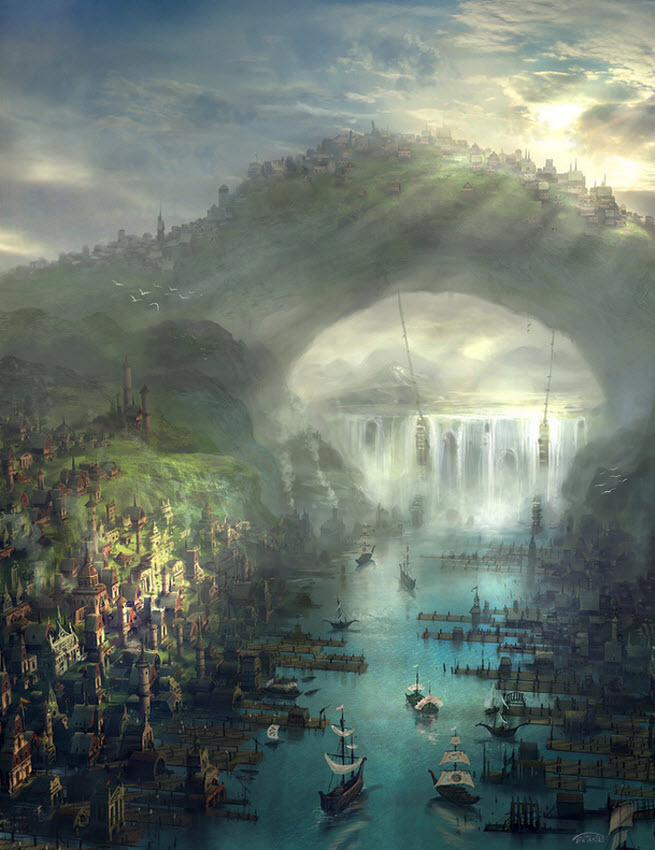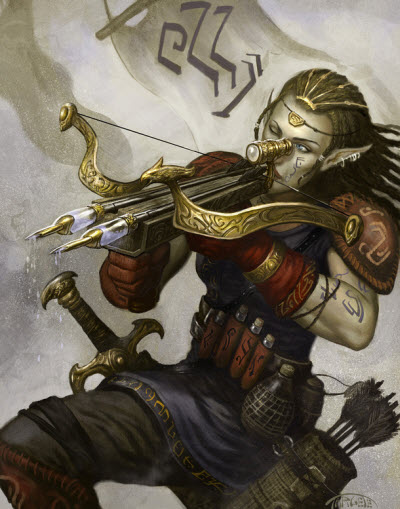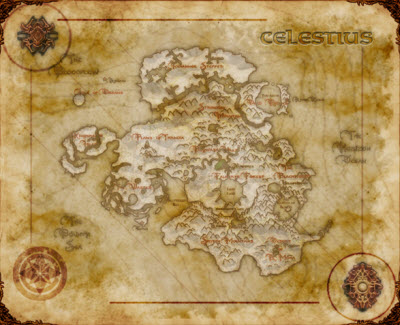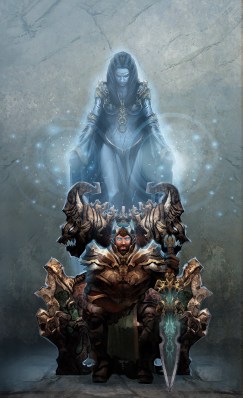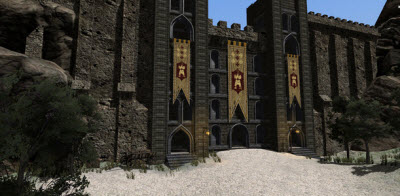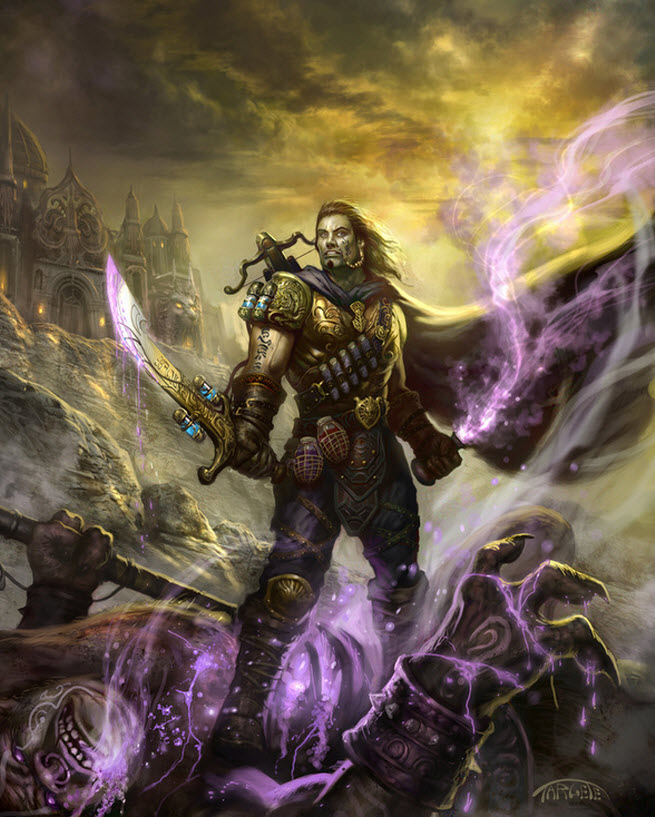GamesBeat: As far as what makes it unique, it sounds like the combat system is going to be more modern and accentuate group play.
McQuaid: Yeah, the game is definitely group-focused. We feel that when you do something as a group, it creates a more memorable experience. You’re sharing that experience with others.
Salim Grant: In general, we’re looking at older games, where the focus was less on who can do the most damage per second in an ideal rotation. We’re more focused on watching the combat and reacting to certain things or using utility abilities when you should use them, as opposed to just being part of a rotation.
One of the cool things about the system is that, because of our lore and this world being an amalgamation of a bunch of different planes — the players themselves are fallen heroes who’ve been reborn. Your goal is to collect your artifacts of whatever you were when you were a hero.
McQuaid: In centuries or millennia past, you were defeated. Now, when the player’s actually playing the game, it’s all about growing and empowering and regaining what you had in the past. The history is about the fact that you fell. The game is about the fact that now you’re risen again, about becoming even more than who you were.
Grant: Along the way, you’re going to discover the essences of other fallen heroes that are linked to a world. You can equip those and put abilities in them and mix and match abilities that are limited by your class. Equipping those essences, they have levels associated with them. Some of them will actually let you take on the look of a hero and gain extra power.
It’s a cool concept in that you can swap out different ability sets, but the big thing is that, combat-wise, you are limited in how many abilities that you have available to you. It’s kind of like a deck of cards. This is the hand that’s been dealt to you. You can only use these seven cards. You have to think about the next encounter or group of encounters. I’m going into this dungeon and I know how the mobs work there, so here’s my setup. Then, when I get to a boss , I need to think about this set or the other and maybe load a different set of abilities.
Abilities have a broad range. Some might be standard mana-based abilities, but another might say you could only use it three times in combat, for example. You need to mix them up. You’ll have a standard set of abilities you pick up through a steady progression, but there’s a bunch more you can discover, or templates you can discover. There’s a lot of motivation to go out and explore.
GamesBeat: We have a lot of MMOs out there already and EverQuest Next coming as well. Is there something you’re reacting against here? In what way do you want this to be different from other MMOs?
McQuaid: I’m excited for EverQuest Next, personally. It’s really neat technology. We’re not focused on what might be wrong with other games. But we do feel that there’s a type of game that’s missing. That’s the hole that we’re trying to fill, that challenging, group-oriented game.
GamesBeat: As far as what you plan to deliver, is there a clear modular approach here, where if you get a certain amount of funding, then you can deliver a certain package, but you can add on more elements if you hit a higher funding goal?
McQuaid: Yeah, that’s exactly right. If we meet the stretch goals, what we’re saying is that the game we’ll deliver at launch will have those features. Any stretch goals we don’t meet, they’re still part of our high-level design. We would just have to add them as expansions or downloads, things like that, later on after launch. It’s more of a timing issue. The game is going to have all that stuff at some point. The question is when. That’s a matter of when the money becomes available.
GamesBeat: What’s in the basic feature set that you’re promising?
McQuaid: It’s a solid game about adventure and exploration, going into the depths of a dungeon and defeating boss monsters, building your character, working with other players in a group, feeling good that you play a role within that group, learning our combat system and becoming an expert. It’s that old-school mix of exploration and combat.
If the stretch goals are met, or if we do them as an expansion, we can add other cool things like harvesting, crafting, things like that. But it’ll be a complete game when we launch, no matter what. It’s just a question of how varied the features turn out to be. We would not launch something that felt incomplete, where something glaring is missing. That’s not the plan.
GamesBeat: Do you have a time frame set?
McQuaid: We have a rough time frame. We think we can launch the core game in three years. We’d like a long beta test, so the beta — which would cover different phases — would be about a year. We hope to see people in a beta playing the game and helping us refine and polish it within a couple of years.
GamesBeat: What sort of audience are you looking for? It seems to be a more hardcore style of game.
McQuaid: We don’t really like the term “hardcore” because it can mean so many different things. We try to be more specific. It’s for players who want a challenge. They don’t mind being defeated and learning from that and coming back to eventually prevail.
Our type of player is very social. I use a kind of silly analogy. When I go to the movies, I always want to go with someone else so we can talk about the movie afterward. To me, it’s a social experience. But there’s plenty of people who go to the movies by themselves. It’s the same with Pantheon. Some players have a much better time working together as a team. It’s more like a sport, like soccer, where you have a goalie and defenders and midfield and strikers. If they’re not all in sync and filling their roles, they’re going to get beaned. It’s the same thing here, where everybody has their roles.
We’ve been labeled “old-school.” I think I’ve used the term myself. But it’s also important to stress that we understand that the players who did play those early MMOs, like EverQuest, and who did enjoy the challenge — we understand that they’re older now. They have jobs and families. Even though the game is going to be challenging, we’re not going to have situations where you have to be logged in for four, six, eight hours in order to accomplish something. It may still take that much time, but the players can log off, take a break, log in tomorrow, and continue on. It’s not a question of being continuously online for that long.
GamesBeat: What else would you say is more modern about this?
Grant: The modern twist, I’d say, is more of a focus on bringing refinements that fit within the identity of our games, things like user interface customization. We’re trying to bring those refinements to how we handle things like guild functionality and grouping and getting people together, without wading too far outside of what we’re trying to do here, which is bring back and represent that older style of challenge when it comes to MMO gameplay.
We want to bring back that epic feel. Vanguard was a good example of that kind of style. Going from where you start, say, to that mountain off in the distance is an adventure in itself. That’s not necessarily present in today’s games, or games since Vanguard.
GamesBeat: I don’t know how you would put it, but it seems like MMOs are one of the last frontiers for indie developers. Indies have been breaking into many other genres and areas of the business, but MMOs have been such a big-budget area for a long time that it’s hard to crack that corner of the market.
McQuaid: In one sense, we’re indie, because we’re doing crowdfunding and we have a smaller team. But at the same time, our team is full of veteran MMO developers. We’ve worked on multiple games, shipped multiple games. That gives us an advantage that perhaps other small indie groups don’t have. It gives us the confidence to know that we can do this.
Grant: The other big thing is just the engine we’re using. When you talk about budget, one of the best things we’re doing is using an engine that has a large community creating stuff and releasing and selling it. The engine is constantly being updated. It has a lot of awesome modern features. It’s easy to port to different platforms. A lot of the cost of development is already worked out there because we decided to go with Unity. That helps break down the notion of needing a big budget, and it gets the designers and artists in there more quickly. We can start working on the game instead of waiting a year or two for an engine.
McQuaid: Normally a project would not release a lot of information until the game was more finished. Another advantage we have is that we can come out and talk a lot more about the game. We’ve also been straight up with people when it comes to areas that we want their feedback on. They’re in the development process with us. We want to spread the word and build a community.
VentureBeat's mission is to be a digital town square for technical decision-makers to gain knowledge about transformative enterprise technology and transact. Learn More
